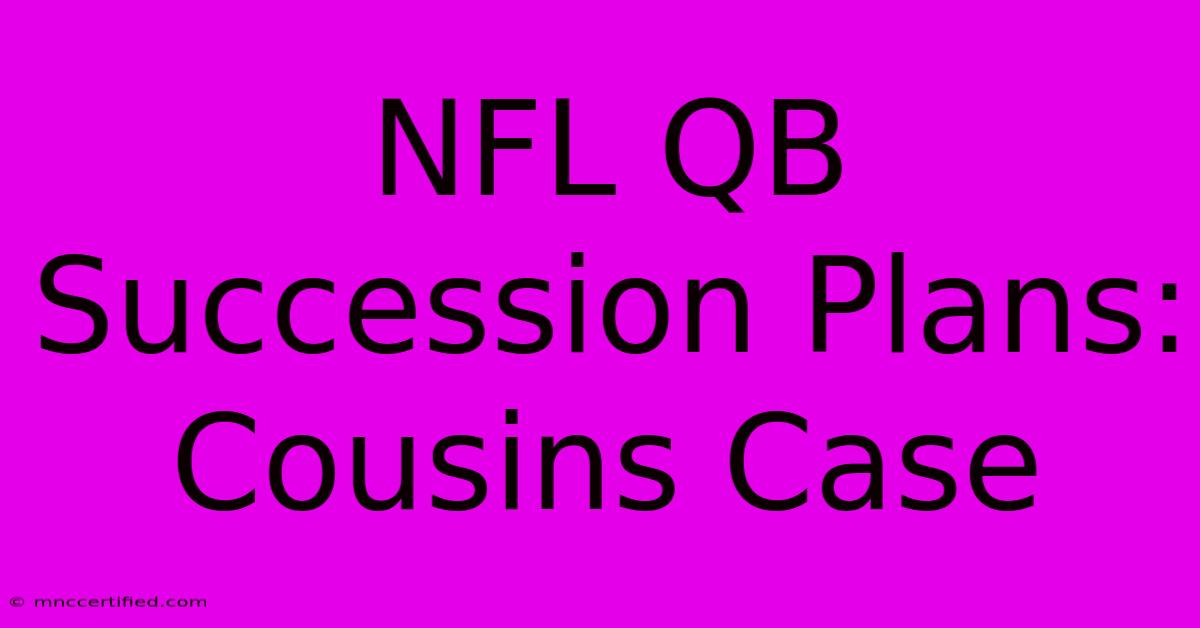NFL QB Succession Plans: Cousins Case

Table of Contents
NFL QB Succession Plans: The Kirk Cousins Case Study
The NFL is a league obsessed with winning now. This relentless pursuit of immediate success often overshadows the crucial, long-term strategy of quarterback succession planning. While some teams meticulously groom their future signal-callers, others find themselves scrambling when their franchise quarterback's performance dips or contract expires. The case of Kirk Cousins presents a fascinating and complex study in this delicate balancing act.
The Cousins Conundrum: A Tale of Two Eras
Kirk Cousins' career has been a journey of defying expectations and consistently exceeding modest projections. Drafted in the fourth round by the Washington Redskins (now Commanders), he wasn't initially seen as a franchise quarterback. Yet, he seized opportunities, displaying a strong arm, accuracy, and a surprisingly resilient leadership style. However, his early success also presented the Commanders with a significant challenge: how to manage the transition from a temporary solution to a long-term investment.
This initial period highlights a key aspect of QB succession: identifying potential early. While Cousins wasn't a first-round pick, his performance forced Washington's hand. They could have drafted a quarterback earlier, establishing a clear succession plan, but they gambled on Cousins' development – a gamble that paid off in short-term wins, but ultimately delayed long-term solutions.
The Contractual Tightrope Walk
Cousins' subsequent contract negotiations with Washington became a saga in themselves. The franchise tag, used twice, underscored the team’s uncertainty and the lack of a definitive plan. This illustrates another vital component of succession planning: proactive contract management. Failing to secure Cousins long-term early on put the Commanders in a difficult position, potentially hindering their ability to build a consistently competitive roster.
The eventual move to the Minnesota Vikings offered Cousins a fresh start, a lucrative contract, and, crucially, a team seemingly prepared to commit to him as their quarterback of the present and potentially the future. This seemingly settled the question of succession for Minnesota, but only temporarily.
The Vikings' Shifting Sands: A New Generation Looms
Despite consistent performance from Cousins, the Vikings are now once again facing the complexities of QB succession. While Cousins has delivered statistically impressive seasons, Minnesota hasn't reached the ultimate goal – a Super Bowl victory. This raises the question: is consistent regular-season success enough? When considering quarterback succession, teams must define success beyond statistics and consider playoff performance and overall team impact.
The presence of younger quarterbacks in the league and the draft adds another layer. While Cousins might still be performing at a high level, the ever-present pressure to find "the next big thing" continues to loom. The Vikings, to their credit, have drafted and developed quarterbacks, demonstrating a degree of planning that Washington initially lacked. However, their success in grooming a suitable successor to Cousins remains uncertain.
Lessons Learned from the Cousins Case
The Kirk Cousins experience offers several valuable lessons for other NFL teams:
- Early Identification is Key: Don't underestimate late-round picks or undrafted free agents. But also aggressively scout and draft potential franchise quarterbacks early.
- Proactive Contract Management: Avoid situations where the quarterback's contract becomes a contentious issue, hampering roster building.
- Define Success Holistically: Winning games is crucial, but assess quarterbacks based on postseason performance, team leadership, and long-term potential.
- Continuous Scouting and Development: Maintain a pipeline of young quarterbacks through the draft and free agency.
The Kirk Cousins saga isn't over. His future, and the Vikings’ quarterback situation, remain fluid. But his career, filled with both triumphs and strategic challenges, serves as a vital case study in the intricacies of NFL quarterback succession planning, showcasing the importance of foresight, proactive decision-making, and a clear understanding of what constitutes true long-term success.

Thank you for visiting our website wich cover about NFL QB Succession Plans: Cousins Case. We hope the information provided has been useful to you. Feel free to contact us if you have any questions or need further assistance. See you next time and dont miss to bookmark.
Featured Posts
-
Chiefs Win Another Close Game
Dec 22, 2024
-
Usyk Fury 2 Fight Live Espn Results
Dec 22, 2024
-
Fairness Act Clears Senate Social Security
Dec 22, 2024
-
Senate Enacts Social Security Fairness
Dec 22, 2024
-
Watch Ravens Vs Steelers Nfl Kickoff
Dec 22, 2024